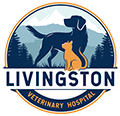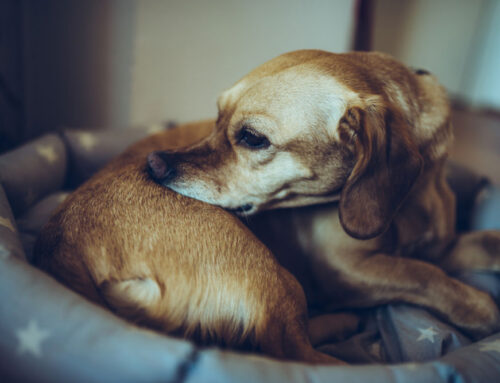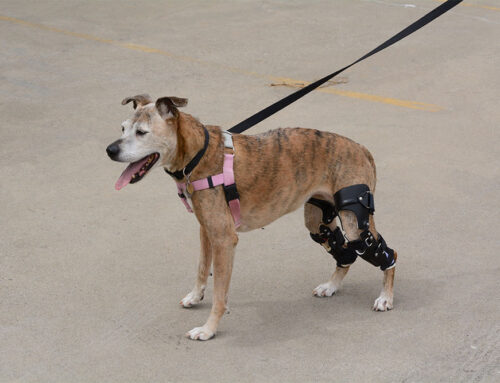Thanksgiving is a time for family, food, and togetherness—and that includes our beloved pets. However, while we enjoy the holiday feast, it’s essential to be aware of the hidden dangers it can pose to our animals. At Livingston Veterinary Hospital, we’re dedicated to ensuring your pet’s safety during the holidays. By knowing what to avoid and preparing properly, you can keep your pet safe while celebrating Thanksgiving.
Common Thanksgiving Hazards for Pets
Many Thanksgiving foods that we enjoy are harmful to pets. Here’s what you should watch out for:
- Turkey Bones: While turkey might seem like a treat, the bones can splinter easily, leading to choking, intestinal blockages, or even tears in the stomach or intestines, which require emergency surgery to correct. Stick to boneless, skinless pieces of cooked turkey, and always monitor how much your pet is eating.
- Chocolate: Chocolate, especially dark chocolate, contains theobromine and caffeine, both of which are toxic to pets. Signs of chocolate toxicity can range from vomiting and diarrhea to severe symptoms like seizures and even heart failure. For more details on this, read our Chocolate Toxicity in Pets article.
- Artificial Sweeteners (Xylitol): Xylitol is often found in sugar-free desserts and is extremely toxic to dogs. Just a small amount can cause a sudden release of insulin, leading to dangerously low blood sugar levels. Symptoms of xylitol poisoning include vomiting, loss of coordination, and seizures. In severe cases, xylitol can lead to liver failure and death.
- Grapes and Raisins: Both grapes and raisins can cause kidney failure in pets, though the exact reason is not well understood. It’s best to keep any fruit platters or dishes containing these fruits well out of reach.
- Fatty Foods: Foods high in fat—such as gravy, butter, and some holiday casseroles—can trigger pancreatitis in pets. This is a painful and potentially life-threatening inflammation of the pancreas. To learn more, see our article on Pancreatitis in Pets.
- Toxic Plants: Some popular holiday plants, like lilies and chrysanthemums, are toxic to pets. Lilies, in particular, are highly dangerous for cats and can cause kidney failure if ingested, even in small amounts. Always place plants out of reach or opt for pet-safe varieties.
Non-Food Risks During Thanksgiving
Food isn’t the only risk to pets during Thanksgiving. Here are a few additional hazards to keep in mind:
- Candles: Flickering candles create a cozy atmosphere, but they can be easily knocked over by a curious pet, leading to burns or even fires. Consider using flameless LED candles to prevent accidents.
- Electrical Cords: Electrical cords from holiday lights or heated trays can look like chew toys to some pets, especially young puppies or kittens. Chewing on cords may result in electric shocks, burns, or even fatal electrocution.
- Holiday Guests and Loud Noises: Thanksgiving often means gatherings, and pets that are nervous around guests or sensitive to noise may become anxious. Providing a quiet retreat in a separate room can help reduce stress. Consider adding a blanket, a few toys, or even calming pheromone diffusers to make the space comfortable.
Symptoms to Watch For
If your pet manages to consume something harmful, early recognition of symptoms can be life-saving. Look out for signs such as:
- Vomiting and Diarrhea: These are common signs of food-related distress or toxicity.
- Lethargy: A lethargic pet may be experiencing a response to a toxic substance.
- Agitation or Unusual Behavior: Restlessness or agitation can sometimes indicate toxicity, especially if paired with other symptoms.
- Abdominal Pain or Distension: Severe pain or a swollen abdomen may indicate a gastrointestinal issue or pancreatitis. Pets with pancreatitis often show signs of intense pain after eating and may not want to move or eat.
If any of these symptoms are severe or persist, it’s essential to contact your veterinarian immediately.
Preventative Measures

Here are some proactive steps you can take to keep your pet safe this Thanksgiving:
- Create a Pet-Safe Thanksgiving Meal: Make your pet feel part of the celebration with safe, pet-friendly foods. You can find some great recipe ideas in our Pet-Friendly Thanksgiving Meal Guide.
- Secure Trash Cans: Trash can be a tempting treasure trove of scraps and leftovers, so be sure your trash cans are secure or out of reach to prevent pets from scavenging potentially harmful foods.
- Exercise Before Dinner: Giving your pet a good walk or play session before guests arrive can help expend some energy and reduce anxiety. A tired pet is less likely to beg for food or get into trouble.
- Keep Emergency Contacts Handy: Save our clinic’s contact information and locate the nearest 24-hour veterinary emergency clinic ahead of time. Having this information readily available can make a huge difference in the event of an emergency.
Emergency Preparedness
Despite your best efforts, accidents can happen. Should your pet eat something dangerous, it’s crucial to know what to do. For any suspected poisoning, avoid inducing vomiting without veterinary guidance. Some substances, like sharp bones or corrosive chemicals, can do further harm if vomited.
In case of an emergency, call us immediately or go to the nearest 24-hour veterinary hospital. You can also call the ASPCA Poison Control Hotline at (888) 426-4435, but remember that quick veterinary care is usually the best option.
How Livingston Veterinary Hospital Can Help
At Livingston Veterinary Hospital, we’re here to support you and your pets during the holiday season with a range of services including emergency care, boarding, and even pre-holiday check-ups. We can also help you understand common toxins, handle emergencies, and provide guidance for creating a pet-friendly holiday experience. Visit our Services Page for more information on how we can support you this Thanksgiving.
Thanksgiving is a time to celebrate with loved ones, including our pets. By following these tips, you can ensure a safe, joyful holiday for everyone in your family. If you have questions about any of these risks or would like to schedule a pre-holiday check-up, please don’t hesitate to reach out. We’re here to help make this Thanksgiving as safe and stress-free as possible for you and your pet.







Leave A Comment